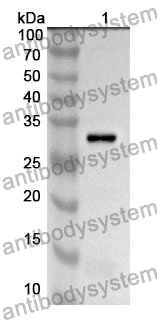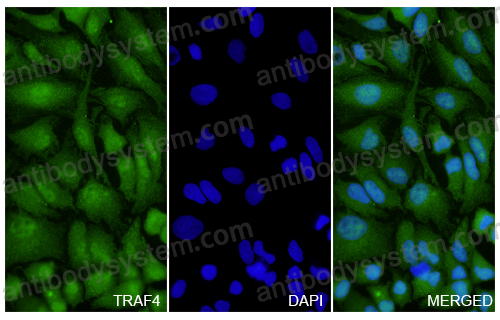Catalog No.
PHJ50001
Species reactivity
Human, Mouse, Rat
Host species
Rabbit
Isotype
IgG
Clonality
Polyclonal
Immunogen
E. coli - derived recombinant Human TRAF4 (Gln193-Asp444).
Tested applications
ELISA: 1:4000-1:8000, IHC: 1:50-1:100, WB: 1:1000-1:4000
Target
CART1,MLN62,RING finger protein 83,TRAF4,MLN 62,Cysteine-rich domain associated with RING and Traf domains protein 1,RNF83,Metastatic lymph node gene 62 protein,TNF receptor-associated factor 4
Purification
Purified by antigen affinity column.
Accession
Q9BUZ4
Applications
ELISA, IHC, WB
Form
Liquid
Storage buffer
0.01M PBS, pH 7.4, 50% Glycerol, 0.05% Proclin 300.
Stability and Storage
Use a manual defrost freezer and avoid repeated freeze thaw cycles. Store at 2 to 8°C for frequent use. Store at -20 to -80°C for twelve months from the date of receipt.
TRAF4 hyperactivates HER2 signaling and contributes to Trastuzumab resistance in HER2-positive breast cancer., PMID:35864174
In vivo evidence that TRAF4 is required for central nervous system myelin homeostasis., PMID:22363515
Delineation of apoptotic genes for synergistic apoptosis of lexatumumab and anthracyclines in human renal cell carcinoma cells by polymerase chain reaction array., PMID:22205156
Role for Traf4 in polarizing adherens junctions as a prerequisite for efficient cell shape changes., PMID:21986496
Involvement of IRAKs and TRAFs in anti-β₂GPI/β₂GPI-induced tissue factor expression in THP-1 cells., PMID:21901230
Characterization of immune functions in TRAF4-deficient mice., PMID:18284467
Tumor necrosis factor receptor-associated factor (TRAF) 4 is a new binding partner for the p70S6 serine/threonine kinase., PMID:12801526
Expression of the tumor necrosis factor receptor-associated factors (TRAFs) 1 and 2 is a characteristic feature of Hodgkin and Reed-Sternberg cells., PMID:11144929
CD40 ligand-induced apoptosis is Fas-independent in human multiple myeloma cells., PMID:10784400
p38 MAPK is required for CD40-induced gene expression and proliferation in B lymphocytes., PMID:9759836
TRAF-4 expression in epithelial progenitor cells. Analysis in normal adult, fetal, and tumor tissues., PMID:9626059


